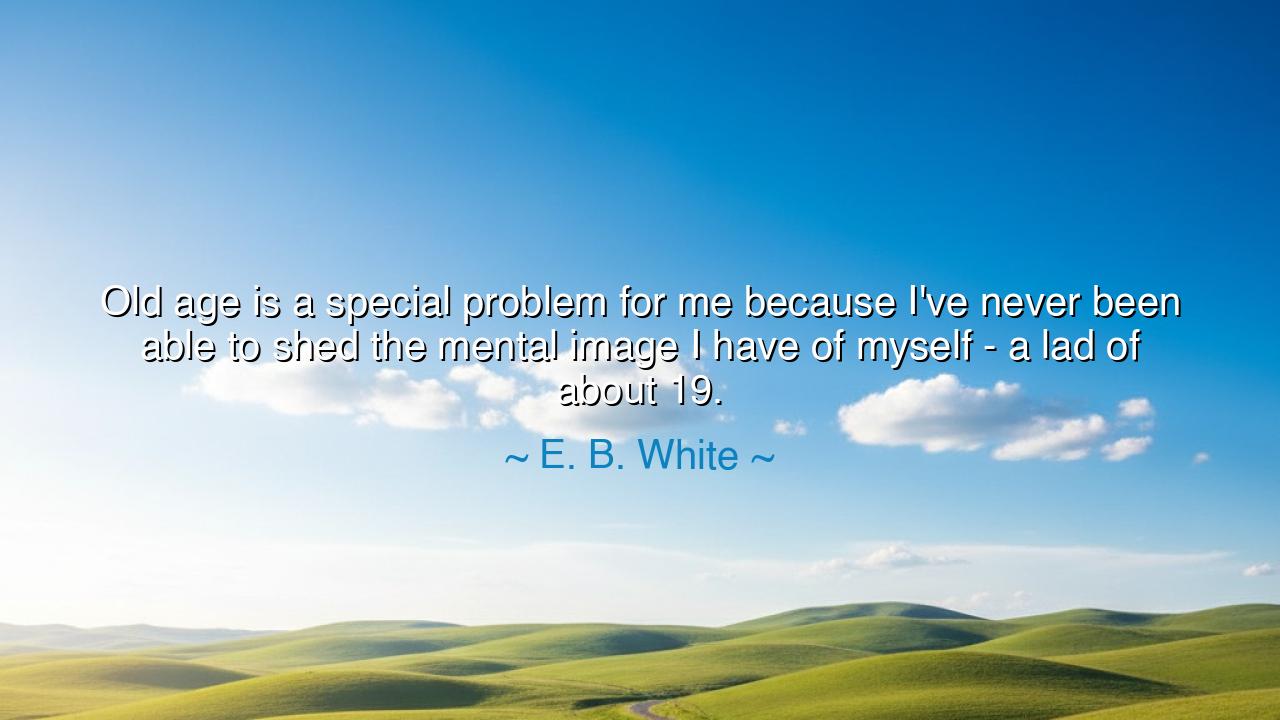
Old age is a special problem for me because I've never been able
Old age is a special problem for me because I've never been able to shed the mental image I have of myself - a lad of about 19.






In the journey of life, we often find ourselves held captive by the image we have of ourselves. The mind is a curious thing, ever-changing, yet often stubbornly attached to the image we have crafted of ourselves in youth. The great writer E. B. White, in his poignant reflection, captures this inner tension with a statement that rings true for so many of us: “Old age is a special problem for me because I've never been able to shed the mental image I have of myself - a lad of about 19.” These words reveal the struggle of reconciling the body’s decline with the mind’s refusal to let go of its youthful vigor. As we age, the body may change, but the mind—trapped in a different time—often resists those changes, holding on to the vitality and promise of youth.
What, then, does it mean when White says that he has never been able to shed the mental image of himself as “a lad of about 19”? It speaks to the disparity between how we see ourselves and how the world sees us. The image of youth, with its boundless energy, hope, and possibility, is a powerful thing. It shapes the very essence of who we are. Even as the years pass, the mental image we hold often lingers, untouched by the ravages of time. The reality of aging, however, forces us to come to terms with a body that does not reflect the image in our minds, creating a dissonance between our inner youth and the outer reality.
The ancients too, understood this profound struggle, this gap between mind and body. Socrates, in his later years, reflected on the frailty of the body and the steadfastness of the soul. Though his body aged and deteriorated, his mind remained sharp, and he often expressed a sense of frustration with the inevitable changes that come with old age. Similarly, Cicero, the Roman philosopher, also spoke of the challenges of growing old, noting how the mind, when practiced in wisdom, may retain its youthful energy, even as the body becomes weary. In their wisdom, these ancient figures remind us that the mind is both timeless and fragile, a force that shapes our identity but is often out of alignment with the reality of our aging bodies.
Consider the story of Benjamin Franklin, whose mind remained vigorous well into his later years. Though he was aging physically, his curiosity and sharp intellect never dulled. Franklin's life demonstrates the paradox of aging: the mind and the body may be at odds, but it is through the mind's power to adapt, to learn, and to grow that one can maintain a sense of youth despite the inevitable passage of time. Franklin's remarkable achievements in his later years, including his work in diplomacy and his contributions to science, show that it is not the age of the body that defines us, but the vigor of the mind. In this, we find the lesson that the struggle White describes is not one of defeat, but of adaptation—a chance to embrace the wisdom of age while still honoring the vitality of youth within.
The lesson White’s words offer us is one of acceptance and balance. We must learn to navigate the discrepancy between the youthful image we carry of ourselves and the physical realities of aging. It is natural to struggle with this tension, but in acknowledging it, we find a path to wisdom. The mind, though it may hold the image of youth, must also recognize the power of age—the strength found in experience, the richness of memory, and the clarity that comes with living a full life. The key is to accept the changes in the body while continuing to nurture the mind, finding ways to adapt and grow, just as the ancients did.
In our own lives, we must not let the image of youth bind us to unrealistic expectations. Just as Socrates and Cicero embraced the wisdom of age, we must learn to embrace our evolving selves, acknowledging the gifts that each stage of life brings. Whether we are in our twenties or our seventies, we must honor the journey we have traveled and continue to forge a path of growth, learning, and curiosity, refusing to let the aging process define us in negative terms. Instead of trying to hold onto youth, let us celebrate the evolution of the self—the youthful vigor of the mind, even as the body ages, and the deeper wisdom that comes with embracing the fullness of life.
Therefore, let us take White’s words not as a lament but as a call to action. The mental image we carry of ourselves may not always align with the body we inhabit, but this does not mean that the passage of time is our enemy. It is simply another stage in our journey, one that requires us to adapt, to continue seeking growth, and to celebrate both the youth within us and the wisdom we have gained along the way. Let us embrace this contradiction, for it is through this tension that we come to truly understand the beauty and complexity of the human experience.






AAdministratorAdministrator
Welcome, honored guests. Please leave a comment, we will respond soon